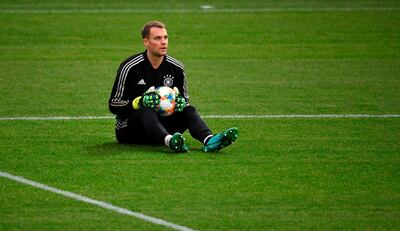Four nights after his milestone 200th appearance for Barcelona, Marc-Andre ter Stegen tonight makes his first start for his country for over a year. It is a special occasion, he was reminded. Germany against Argentina in Dortmund may be a friendly, but the performance of the home goalkeeper will draw close scrutiny.
Ter Stegen addressed the media yesterday, expecting to be coaxed to come boldly off his line, to face tests of his reflex responses to questions about the controversies he provoked after the last international break.
“Trips with the national team have been really hard for me,” he had said, having watched his latest two Euro 2020 qualifiers from the bench, adding that his growing status at Barcelona left him frustrated at playing perennial back-up to Manuel Neuer with his country.
With those remarks, the fragile rebuilding efforts of a Germany in recovery from a disastrous 2018 World Cup were rocked. Neuer criticised Ter Stegen, while Bayern Munich president, Uli Hoeness made the inflammatory suggestion that, were Bayern's Neuer to be demoted by Germany coach Jogi Loew, no Bayern players should answer national call-ups, a statement Hoeness swiftly retracted.
This week, the carefully-organised peace plan. Loew told Ter Stegen he would play against Argentina, but that the hierarchy would be restored for Sunday’s Euro qualifier in Estonia. For Loew, Neuer is “captain and number one goalkeeper” all the way into the European Championship finals next summer.
So was tonight, against an Argentina missing Lionel Messi because of suspension, just a consolation prize for the ambitious Ter Stegen? The goalkeeper did not feel like that, he said. “It’s an opportunity for everyone to show their best. Jogi has made his statement, and obviously Manu [Neuer] has a head-start. But I want to make it as hard as possible for the coach not to pick me. You never know what might happen in the next nine months.”
He and Neuer have a “professional relationship,” Ter Stegen insisted, though he acknowledged the Bayern-versus-country controversy their rivalry had grown into had generated “too much talk”.
There will be more talk. Ter Stegen, now as valued at Barcelona as perhaps any player except Messi, has his lobbyists; Neuer counts on an almost absolute faith in his leadership, experience and proactive style from Loew. And the duel plays into a favourite national storyline, of fine keepers contesting a single jersey, unable to keep their combat quiet.
A decade or so ago, there was Bayern Munich’s Oliver Kahn versus Arsenal’s Jens Lehmann, men who talked about each other more than they ever exchanged pleasantries. “What would we talk about?” Lehman once said of his rival, adding that aspects of Kahn’s colourful private life meant they had little in common.
It was in a game against Argentina, in Berlin in the summer of 2006, that Kahn and Lehmann finally ended their enduring Punch-and-Judy joust with a famous, photogenic moment. Germany were a penalty shoot-out away from a World Cup semi-final and Kahn, who had been demoted before the tournament to second choice, had his most important conversation with Lehmann just before the spot-kicks. Tips were shared, encouragement given. Lehmann made two saves, putting Germany through.
Loew was assistant coach at the time, trying to delicately manage the rivalry. He stuck with Lehmann for two years after becoming head coach and then welcomed the emergence of Neuer as a dashing young keeper apparently designed for a modern, high-line, play-from-the-back football.
Neuer takes risks in marking out his domain well beyond the edge of the penalty area. His errors, though rare, are conspicuous, but his boldness has been an asset for the best part of a decade.
Loew trusted Neuer in 2018, even when the Bayern keeper came out of a nine-month injury lay-off only weeks before the World Cup, Ter Stegen having deputised capably through the absence. Neuer started and finished the short campaign as No 1, and the only blessing for Loew was that Germany’s disastrous group stage exit meant Ter Stegen had less time to seethe on the substitutes bench.
But seethe he did, complaining last month: “It’s hard to find an explanation.” Neuer answered sharply: “We are a team, and should be acting as a team. We have several superb goalkeepers who all want to be playing.”
That was a nod to Arsenal’s Bernd Leno, currently third in Loew’s hierarchy. Leno and Ter Stegen came through Germany’s age-group teams together, when the ferocity of their competition for a starting place became notorious. They shared a room at one stage in their teens. It did not work out, so they were kept apart.
Neuer, at 33, knows he will eventually be deposed. Ter Stegen is 27. Leno’s bad luck is to be exactly the same age. He has perhaps a decade of spiky rivalry to come.



